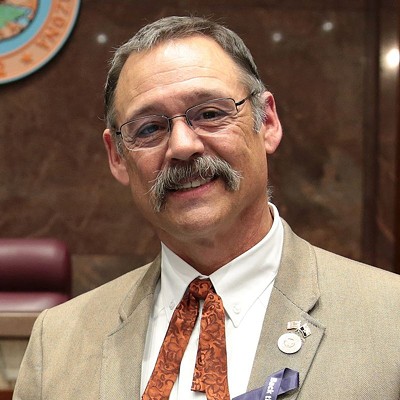Many political careers have been forged by throwing down the hammer on criminals. Conservatives in particular have crusaded for cutting parole and mandating gargantuan sentences.
But amid bleeding budgets and dwindling tax revenues, even some right-wingers are rethinking—albeit uncomfortably—the wisdom of draconian penal policies.
Other hardliners, of course, are not. They include Arizona Senate President Russell Pearce, and Sen. Ron Gould, who chaired the legislature's Senate Judiciary Committee in the recently concluded session.
As a result, while funding for K-12 education was cut by roughly $183 million, the Arizona Department of Corrections budget got a $15 million boost.
Neither Pearce nor Gould returned a call from the Tucson Weekly seeking comment. But both men may be bucking fate, considering they're up against such groups as the right-leaning Texas Public Policy Foundation, which advocates "The Conservative Case for Reform: Fighting Crime, Prioritizing Victims, and Protecting Taxpayers." (See www.rightoncrime.com.)
Among other things, the "Conservative Case" argues for modernizing probation practices to keep offenders from going back to prison (Arizona already has a start in this with its Safe Communities Act of 2008), and offering them clear-cut incentives for sticking with their probation guidelines.
The "Conservative Case" also suggests incentives for counties to increase supervision for high-risk offenders to keep them out of jail.
These are called "evidence-based" policies, because the evidence shows that they work—regardless of their political expediency.
According to a report by the Pew Center on the States, the Safe Communities Act of 2008 spurred a 29.3 percent reduction in the number of probationers being returned to prison, saving Arizona taxpayers the $36 million it would have cost to house them.
At least one conservative Republican lawmaker, State Rep. Cecil Ash of Mesa, seems to be putting facts ahead of ideology. Ash has sponsored several bills to reduce mandatory sentencing for certain crimes, and to boost probation options. Not surprisingly, he's been blocked at every turn; when Ash introduced such a measure in 2010, Gould snapped to The Arizona Republic that the reform bill would "never see the light of day."
In a state where the prison population has grown 10-fold over the last 30 years, Ash's measures could save taxpayers an estimated $1 billion each year.
Rep. Ash didn't return a phone call seeking comment.
Reform advocates have paraded similar numbers in their push for change. Anything less is an opportunity lost, says Caroline Isaacs, program director for the American Friends Service Committee office in Tucson. The AFSC has long fought for prison reform.
Isaacs ranks the Department of Corrections among "the sacred cows" of the GOP legislative leadership. "There's no question about it. Police, prisons, firefighters—that kind of stuff, you don't mess with. It's fine if you de-fund public education, but leave the prisons alone."
That attitude is costing us dearly, she says. "Look at all these other states that have reduced their prison populations and saved oodles of money—not to mention lowering their crime rates. But that just doesn't make an impression here."
Even the DOC itself has shown where cuts could be made. Following a 2009 directive by Gov. Jan Brewer for each department to identify specific belt-tightening measures, the DOC listed reductions that could shave its budget by 15 percent. This would be achieved through, among other things, releasing certain felons after they had served one-quarter of their prison time.
According to a recent report from Arizona Attorneys for Criminal Justice (AACJ), such reforms are working elsewhere. The number of states with shrinking prison populations has grown from just nine in 2006 to 24 in 2009. Not one of those states has seen any corresponding increase in crime, says the report.
Take Kansas, for example. While the state achieved a 5 percent reduction in prison populations between 2003 and 2009, the rate of violence dropped by 3 percent, and property-crime rates fell by 16 percent.
In Mississippi—hardly a bastion of bleeding-heart liberalism—lawmakers restored the opportunity for inmates convicted for possessing small amounts of drugs to win parole after serving 25 percent of their prison sentence. The reform saved that state's taxpayers roughly $200 million, according to the AACJ study.
"Arizona policymakers," the report continued, "can restore judicial discretion to sentence people to more-effective, less-costly supervision and treatment options in lieu of prison in cases where such measures would clearly better serve both justice and public-safety objectives."
That discretion could also save a wad of money—and that's what is leading more and more conservatives to take up the cause for prison reform. Even Newt Gingrich, the former speaker of the U.S. House of Representatives and a potential GOP presidential candidate, took up the cause in an op-ed he co-wrote for The Washington Post.
"Americans need to know that we can reform our prison systems to cost less and keep the public safe," wrote Gingrich. "We hope conservative leaders across the country will join with us in getting it right on crime."
That word is also being heard in Arizona's conservative circles, and has been the subject of analysis and statements by Byron Schlomach of the Goldwater Institute, a right-wing think-tank based in Phoenix.
Schlomach points to the DOC's own suggestions for changes in sentencing as a starting point. "That's the sort of thing where, it seems to me, there's real potential for reform and cost-savings," he says.
"Listen, I'm a law-and-order person. But you have to do what's rational and makes sense from a cost perspective, and we're really just failing to do that when it comes to prisons. Many of the far-right people tend to be the ones who resist making these kinds of changes, and I don't really understand that myself."
Schlomach concedes that the issue creates a quandary for conservatives—who find themselves agreeing with liberal reformers. "This isn't the first time that's happened," he says. "But I think this is probably one of the stranger (instances).
"But the bottom line here is that you have to look at the evidence and weigh it out. When it objectively comes back that, yeah, treatment programs work better than long-term incarceration, you've just got to go where the evidence leads."
Even, it seems, if that evidence leads right back home.
"Russell Pearce and Ron Gould are the fiercest" opponents of prison reform in the Legislature, says Schlomach. "But Ron Gould is also nearly always the highest-rated legislator (in the Goldwater Institute's) voting analysis."












